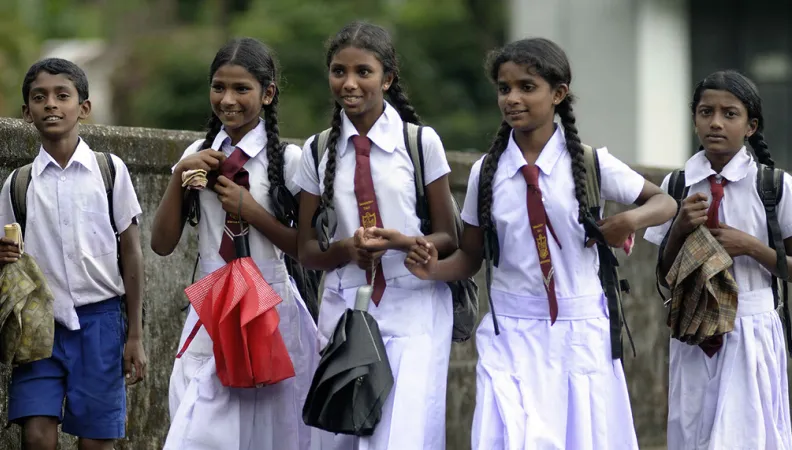Share the page
Transforming Education: AFD Group has Solutions in its Satchel
Published on

Whether it's elementary school, vocational training, or higher education, AFD supports equitable access to quality education and training courses wherever it operates through a wide range of projects and partnerships.
Article first published on September 2, 2022 and updated on September 4, 2023
Children return to school this week across Europe and beyond. But there are still countries where children are being denied the chance to go back to school. "Education, a right for all": this Sustainable Development Goal, which is essential to the achievement of numerous other objectives, is also a source of inequality.
The lifelong acquisition of knowledge and skills (SDG 4) and access to employment (SDG 8) are the cornerstones for a more equitable and sustainable economic and social development. To actively contribute to achieving the SDGs, AFD uses the full range of financial instruments at its disposal, from grants to sovereign loans, to ensure that everyone, especially girls, has access to quality education, from primary school to higher education, from vocational training to employment. The Group has invested €4.3 billion in the sector since 2000, and in 2022, AFD committed €629 million to the education and training sector.
See also: AFD and Education
Since 2015, AFD has also been operating regularly with funds delegated by the Global Partnership for Education (GPE) and the European Union to providing exclusive funding for basic, primary, and secondary education in the countries that need it most. The budgets allocated are calibrated according to criteria that take into account the GDP per capita, the number of children to be enrolled, and the notion of educational gaps. To implement the programs, the GPE entrusts the funds to representatives chosen by the governments of the countries in question, based on their relations and expertise.
In this respect, AFD is today the third largest authority body vested with delegated funds (after the World Bank and UNICEF), and the leading bilateral delegated authority of GPE funds, making use of some €322 million in five West African countries.
Promoting lifelong learning
AFD is convinced that equitable access to quality basic education (pre-school, primary, and secondary school) is the essential foundation for self-reliance and supports universal access to basic education, especially secondary schooling, and improving the quality of teaching and learning. For example, the Group has been supporting the implementation of an ambitious secondary school reform by the Togolese Ministry of Education in Togo since 2014. Funded by an €8 million AFD grant, the program has improved access to school, the quality of teaching and gender equity in secondary schools in two regions of the country.
"AFD Group's main trademark remains its approach based on supporting national policies, in close cooperation with other donors within existing national consultation frameworks," says Virginie Delisée-Pizzo, Head of AFD's Education, Training and Employment Division. "AFD is therefore unique in promoting links between basic education and training leading on to higher education and access to decent employment.”
The Group also supports national and regional research systems to ensure continuity between higher education, research, innovation, and entrepreneurship. As part of the regional ACE Impact program, the World Bank and AFD are funding 44 African Centers of Excellence (ACE) to boost training and research capacity and meet the demand for highly qualified skills and personnel in strategic sectors.
Another major focus is gender equality: "Girls' education is central to AFD's activity," adds Virginie Delisée-Pizzo. "Our operations supported schooling for about one million girls a year between 2018 and 2020. We target secondary education due to the major role secondary schooling plays in empowering young girls, especially in rural areas where there is a combination of vulnerability factors, including the risk of early marriage and pregnancy."
For example, the Group supports the Avenir 2 project run by the NGO Plan International in Cameroon, targeting the most disadvantaged, particularly girls and young women, through inclusive education and socio-economic integration. During the first phase of the project, 165 out-of-school children, including 78 girls, returned to school, and 126 young people, 79% of them young women, gained access to training courses.
See also: Education, Training, and Employment: 2022 Activity Report
AFD partners with France's national education system
In France, AFD Group also wants to be a driving force in educational progress related to the ecological transition. Through an agreement with France's Ministry of Education, the Group provides support to middle schools and high schools, making a range of educational resources available to teachers that include SDG-related issues across the board. The goal is to provide students with a systemic understanding of current and future global issues, and of the interdependence and interconnection of the various sustainable development issues.
"There is no specific subject on ecology, but the SDGs are addressed in a cross-cutting way in several disciplines,” explained Stéphanie Beney, in charge of Partnerships and Educational Projects. “By educating young people in the SDGs, we also shape responsible citizens. ”
